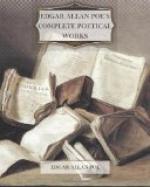I am aware, on the other hand, that the case is by no means common, in which an author is at all in condition to retrace the steps by which his conclusions have been attained. In general, suggestions, having arisen pell-mell, are pursued and forgotten in a similar manner.
For my own part, I have neither sympathy with the repugnance alluded to, nor, at any time, the least difficulty in recalling to mind the progressive steps of any of my compositions; and, since the interest of an analysis, or reconstruction, such as I have considered a desideratum, is quite independent of any real or fancied interest in the thing analyzed, it will not be regarded as a breach of decorum on my part to show the modus operandi by which some one of my own works was put together. I select “The Raven” as most generally known. It is my design to render it manifest that no one point in its composition is referrible either to accident or intuition—that the work proceeded, step by step, to its completion with the precision and rigid consequence of a mathematical problem.
Let us dismiss, as irrelevant to the poem, per se, the circumstance—or say the necessity—which, in the first place, gave rise to the intention of composing a poem that should suit at once the popular and the critical taste.
We commence, then, with this intention.
The initial consideration was that of extent. If any literary work is too long to be read at one sitting, we must be content to dispense with the immensely important effect derivable from unity of impression—for, if two sittings be required, the affairs of the world interfere, and everything like totality is at once destroyed. But since, ceteris paribus, no poet can afford to dispense with anything that may advance his design, it but remains to be seen whether there is, in extent, any advantage to counterbalance the loss of unity which attends it. Here I say no, at once. What we term a long poem is, in fact, merely a succession of brief ones—that is to say, of brief poetical effects. It is needless to demonstrate that a poem is such only inasmuch as it intensely excites, by elevating the soul; and all intense excitements are, through a psychal necessity, brief. For this reason, at least one-half of the “Paradise Lost” is essentially prose—a succession of poetical excitements interspersed, inevitably, with corresponding depressions—the whole being deprived, through the extremeness of its length, of the vastly important artistic element, totality, or unity of effect.




